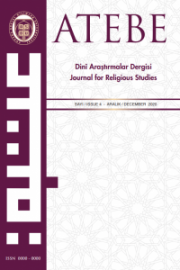
ATEBE Dinî Araştırmalar Dergisi
Yazarlar: ["Luay Hatem YAQOOB", "Muhammet Caner ILGAROĞLU"]
Konular:-
DOI:10.51575/atebe.1206252
Anahtar Kelimeler:İslam Felsefesi,Osmanlı Düşüncesi,Tehâfüt Geleneği,Hocazâde,Tehâfütü’l-felâsife
Özet: In the tradition of Islamic philosophy, mas̲h̲s̲h̲āʾiyyūn have been subjected to serious criticism in G̲h̲azālī’s (d. 1111) work Tahāfut al-Falāsifa, with the claim that their philosophical views are incoherent. Tahāfut, which pioneered the structural transformation of Islamic philosophy, is also the source of the tradition of Tahāfut in Islamic thought. Islamic philosophy in the Ottoman period presents a multidisciplinary structure in which the disciplines of ilm al-kalām, philosophy and taṣawwuf converge in terms of subject, purpose, and method. Besides, it is the continuation of a tradition in which G̲h̲azālī’s thought is dominant in general. philosophy gained momentum with a competition for a work that Fatih Sultan Mehmed wanted to be written on G̲h̲azālī’s Tahāfut. In this competition, K̲hōd̲j̲ā-Zāde’s (d. 1488) Tahāfut al-Falāsifa and Alāʾ al-Dīn ʿAlī al-Ṭūsī’s (d. 1482) Kitāb al-Zuhr competed and K̲hōd̲j̲ā-Zāde’s work won the competition with major praise. This work of K̲hōd̲j̲ā-Zāde entitled Tahāfut al-Falāsifa has an exceptional place in terms of its contribution to both the Islamic philosophy tradition and the tradition of tahāfut. This work, in terms of its theoretical approach, which has a feature that offers insight and method of addressing the issues systematically, is a typical example to the Islamic philosophy of the Ottoman period and gained a considerable reputation at that time. The original name of K̲hōd̲j̲ā-Zāde’s work is Kitâb al-Tahāfut fi'l-Muhākama Bayna'l G̲h̲azālī wa'l Falāsifa. The work consists of twenty philosophical issues. K̲hōd̲j̲ā-Zāde explained his views on all philosophical issues in these twenty-two issues, and also discussed the issues on which G̲h̲azālī conflicted with the philosophers. Three issues that have become important in the tradition of thought after al-G̲h̲azālī denounced the philosophers constitute the main subject of the work. The instructions and annotations written on this work made a great contribution to the development of philosophy in the tradition of Ottoman thought, and moreover, in a sense, it provided the revival of the dusty volume of tahâfut discussions. In this article, by using literature and data analysis methods, the tradition of tahāfut reflecting the course of Islamic philosophy in the Ottoman period and the place and importance of K̲hōd̲j̲ā-Zāde’s tahāfut in this tradition will be revealed. Another aim of this study is the possible relations between K̲hōd̲j̲ā-Zāde's intellectual personality and the structural features of the Ottoman thought tradition.